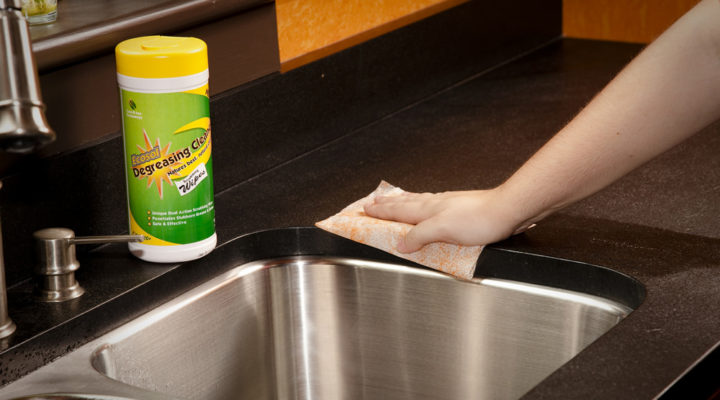
A cleaning kitchen worktop is a long-term investment, so it is better to buy a solid, dependable worktop that will serve you for years to come than skimping on a cheap worktop that will diminish in quality within a few short months. While solid materials such as quartz and granite can take a lot of punishment before showing discernible decline, that’s not to say you don’t need to bother cleaning it. A little TLC will help to maintain the worktop’s quality for many years.
Countertop manufacturers Pennywell created a short yet very informative video (see below) which summaries the best ways to keep your kitchen worktop clean, depending on the type of material you’ve selected. Here’s a quick guide to the most important cleaning tips.
Tips for Cleaning Kitchen Worktops
Granite:
Granite has been amongst the most popular worktop types for decades and its appeal endures to this day. It is usually quite presentable in its appearance and it is largely easy to maintain, as its toughness enables it to withstand plenty of marks and scratches. However, you should always use a chopping board when slicing on a granite worktop and never place boiling hot crockery straight down on it.
If you spill liquid on a granite worktop, wipe it off immediately with warm soap water, a mild dish soap and a soft cloth. Tougher stains may require a mixture of baking soda with water or hydrogen peroxide to form a paste which should be spread liberally over the stain. If you’re trying to get rid of bacteria, spray the worktop with a mixture of water and isopropyl alcohol, leave for approx. 5 minutes before rinsing quickly and wiping with a microfibre cloth.
Quartz:
Quartz is renowned for its durability, which makes it a perennially popular worktop choice amongst homeowners. Plus, its versatility of design allows for a great scope in choosing a color scheme, while its remarkable density allows it to stand up to chipping, stains, and scratches. However, slicing directly onto quartz is not advised, as this could harm its finish.
As with granite, any liquid spills should be wiped straight away with warm water and a clean cloth. For stubborn stains, use Cif or any other non-abrasive cleaner which is capable of removing virtually any stain. If you get a very awkward substance such as gum, grease or paint on a quartz worktop, remove it with a plastic putty knife, as using a metal knife could spoil the surface.
Corian:
Corian has enjoyed increased popularity in recent years, not least because of its extraordinary range of colors and designs, meaning that you’re bound to find a Corian worktop to fit perfectly into your kitchen style. Also, they require comparatively little maintenance but could be damaged if boiling hot pots or pans are placed directly on the surface.
It’s vital to wipe any surface water immediately, as water left on the surface could develop into blotches that roughen the surface. If such blotches form, wipe them in a circular motion with a mixture of water and non-abrasive cleaner. Never use abrasive objects such as scouring pads when cleaning Corian.
Silestone:
Silestone is a modern composite material which is made primarily from quartz, thus sharing many of the properties of quartz, including the non-porosity of the surface. It is resistant to most stains, but tough stains should be cleaned urgently so that they don’t get a chance to settle permanently.
Grease stains should be removed with a cleaner named Q-Action, while limescale stains can be treated with any limescale cleaning product. If silicone marks appear, use a spatula to apply silicone remover. Never use abrasive cleaners such as scouring pads or caustic soda when cleaning a Silestone worktop.
Key takeaways from cleaning kitchen worktops
- Wipe any stains immediately so that they are not given a chance to settle.
- Use non-abrasive cleaners when removing stains, as abrasive products could harm the worktop’s finish.
- Most stains can be removed with warm water and a clean cloth if treated early, but specialist cleaning products might be required for stubborn stains.
Leave a Reply